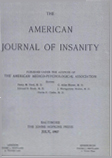A NOTE ON TYPE OF ONSET IN RELATION TO CLINICAL TYPE IN GENERAL PARALYSIS
Abstract
1. In a series of 74 cases of general paralysis, the earliest onset of the disease was marked, in 57 (77 per cent), by abnormality in the emotional sphere of one of two forms: Irritability (in 29), or a seclusive and apathetic type of reaction (in 15); in 13 cases there occurred first the one and then the other as an early symptom.
2. Little correlation appears to exist between the type of onset, in this sense, and the clinical type of general paralysis which later develops, save with regard to the "manic" cases of the fully developed disease; for the patients with an "irritable" onset contributed 30 per cent of the "manic" cases as compared with 19 per cent of the latter in the group as a whole, while 100 per cent of these cases had an "irritable" rather than a "seclusive" type of onset when either of these forms of emotional alteration had a place among the earliest changes observed. In this respect the expansive cases did not differ from the group as a whole. On the part of the simple dementing cases there was, of the two, a slight tendency toward seclusiveness rather than irritability as an initial or early symptom.
3. Loss of weight, increased tendency to sleep, and perhaps also forgetfulness, when these appeared among the earliest symptoms noted, were without significance with regard to the clinical type of paresis which subsequently developed.
4. Of 11 patients who very early exhibited speech defect, all but one fell later into the category of simple dementing cases.
Access content
To read the fulltext, please use one of the options below to sign in or purchase access.- Personal login
- Institutional Login
- Sign in via OpenAthens
- Register for access
-
Please login/register if you wish to pair your device and check access availability.
Not a subscriber?
PsychiatryOnline subscription options offer access to the DSM-5 library, books, journals, CME, and patient resources. This all-in-one virtual library provides psychiatrists and mental health professionals with key resources for diagnosis, treatment, research, and professional development.
Need more help? PsychiatryOnline Customer Service may be reached by emailing [email protected] or by calling 800-368-5777 (in the U.S.) or 703-907-7322 (outside the U.S.).



